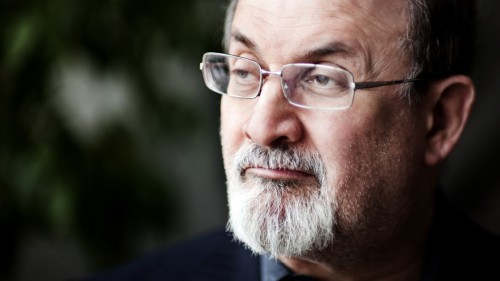“History takes a long time. History doesn’t follow the rules of the news cycle.”
Salman Rushdie slouches on a little black platform in the just-reopened Kepler’s Books last Tuesday afternoon. You can tell he thinks that what he’s just said—that Twitter and cable news and Skype haven’t sped up the grand narratives of history—is a hackneyed truth. His eyes shift down, he disclaims with “if you study history like I did, you know…”; it’s part of the vernacular of pop-methodology, a concept heard too often around the varnished tables of King’s College while he was an undergrad. But you believe it because: 1) he’s Salman Rushdie, 2) he believes it, and 3) it makes sense in the sort of foundational (if hokey) way that banalities sometimes do.
Forget that he says it in response to a distractingly political question-and-answer session, in which after a solid hour of honest conversation about living—not fiction or writing or “being a novelist,” but good, old-fashioned living—with Tobias Wolff, the audience can’t help but pepper Rushdie with questions about Islamic extremism and Benghazi. Because even though he graciously circles back and applies the speed of history to the current course of sociopolitical chaos in the Middle East, this afternoon hinges on the knowledge that history is slow. It hardly moves when you’re being hunted.
As he sits next to Wolff and the sun slithers around the blinds to light up the back of his balding scalp, Rushdie makes clear that he has been a legitimately hunted man. That’s no small claim for a novelist. But Rushdie has also been hunted for longer and more intensely than almost any other person on Earth, and now we have a full autobiography about it: Joseph Anton. To the credit of both Wolff and Rushdie, the book becomes an afterthought—a touchstone for conversation, sure, but not the point of the session. History takes a long time, and not all of it fits in even a hefty hardcover.
Which is why, as the event goes on, the best moments are the ones that aren’t part of the revered Book Press Event Repertoire. Wolff’s introduction includes the story of a summer day when the two men and their families met for food and shenanigans on a lake, and the boys came back from the water joking and dripping and “being boys.” And Wolff pauses, and you look closely and notice that now his eyes are wet, and he barely manages to report what Rushdie told him on the deck of the home: that his son “should have more days like this.” Those days come seldom for a father who’s been sentenced to death by Ayatollah Khomeini.
And the lonely moments. The “habitual sweat of shame,” Rushdie calls it, when he heard the doorbell ring and ran for the basement or the bathroom or somewhere that the repairman at the door wouldn’t need to visit. (Slight and seemingly irrelevant digression here: Rushdie looks exactly the same in person as he does on tv or in the papers or online. It’s eerie. Take like 30 seconds. Google image search it. That’s exactly what he looks like. Now imagine that man, a fairly imposing one between the incisive stare and the shaped goatee and the broad shoulders, stuck in a closet, holding his breath, hoping not to be found or recognized by the guy fixing the pipes.) History has leaden feet.
Rushdie says that he today has the peace he wanted during the twelve years of hiding. The peace that he hungered for as, from his motorcade on the shut-down Place de la Concorde, he spotted confused café customers staring at the security and commotion and wished he were among them, sipping coffee unmolested.
A poorly driven fertilizer truck in Australia came closer to killing him than any followers of Khomeini did; the only gunshot he heard came whizzing from the high-powered weapon of one of the green members of his security detail who had been careless while cleaning his gun. Rushdie says that many drivers get sucked under trucks and literally lose their heads; the bullet, which shot through a wall, down a hall and nearly through another wall, could have killed his wife and unborn son had she not been running an errand. These are, of course, the ironic accidents, the unforeseen/unforeseeable side effects of a much broader narrative. So too, is Rushdie’s Joseph Anton period. An Indian-born, British-educated man wrote a book, and the leader of Iran called it blasphemous and deserving of death to its author.
That narrative is nested, too. This isn’t the story of a man so much as it’s a story about a man inside a very particular world. Rushdie told NPR’s Steve Inskeep in September that “the same mindset, the same extremism that attacked those buildings in New York and Washington, was the one that attacked me. And I think one of the strange things is that when it happened to me, people didn’t really understand it in the West, because they couldn’t set it into a narrative that they understood. And after the September 11 attacks, that narrative became the narrative of all our lives.” Narrative inside narrative inside narrative. Story on story on story.
So the Wolff-Rushdie exchange, without apparently trying, becomes quite the affirmation of what fiction can do. Here, on the little black platform in an independent bookstore reopened for specifically this event, sit two men who have fought and spent years escaping from their unknown would-be killers. In the thick of it. Real life. The heavy s*&%. And here they are, without having to quote Nietzsche or Foucault or Hemingway or much literature at all, implicitly avowing another cliché that’s got to be true: story really, really matters.

